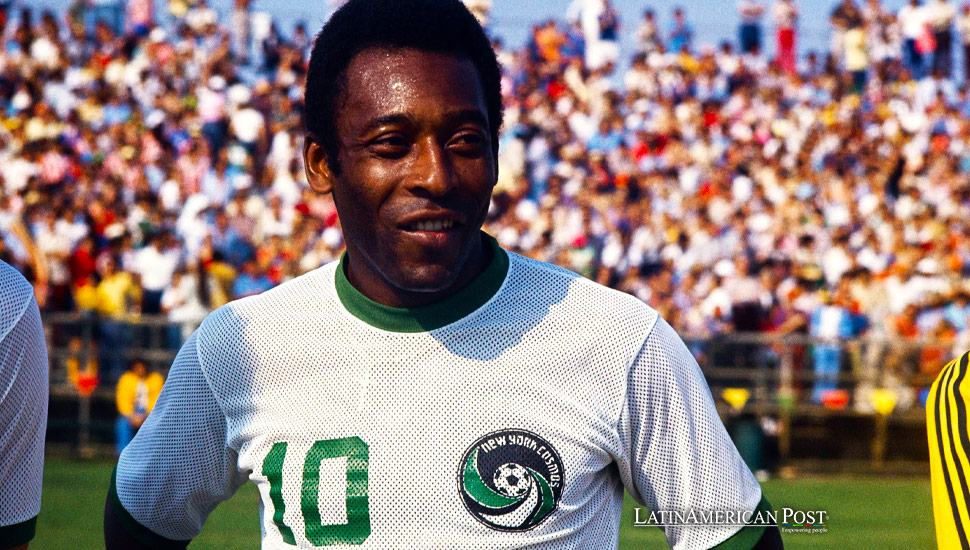Brazilian Legend Pelé’s Unfinished Soccer Dream in Copa America

Despite his status as a global soccer icon and winning the World Cup three times, Brazilian legend Pelé never managed to secure a Copa America title. His sole participation in the tournament in 1959 remains a bittersweet memory for the soccer legend.
The Copa America, the oldest international continental soccer competition, holds a special place in the hearts of Latin American soccer enthusiasts. It is a platform where the best of the region’s talent competes, and winning the title is a prestigious achievement. Pelé, whose full name was Edson Arantes do Nascimento, is often hailed as one of the greatest soccer players in history. However, a Copa America title is one notable absence in his illustrious career. The Brazilian legend only competed in one edition of the Copa America, held in Argentina in 1959. This tournament, the oldest international continental soccer competition, eluded Pelé, leaving a gap in an otherwise stellar career.
In the 1959 Copa America, Pelé emerged as the top scorer, netting eight goals in six matches. Despite his remarkable performance, Brazil did not clinch the title, a surprising outcome given the team’s strength and Pelé’s prowess. This experience was both a highlight and a disappointment in Pelé’s career, showcasing his talent and the unpredictability of soccer. However, it also solidified his status as a soccer icon and set the stage for his future successes, including his three World Cup wins. The 1959 Copa America was a pivotal moment in Pelé’s career, shaping his legacy as one of the greatest soccer players of all time.
A Promising Start with Unmet Expectations
Pelé, then a young forward for Santos FC, was already a rising star when he arrived in Buenos Aires for the tournament. Having won the World Cup in Sweden the previous year, his name became synonymous with soccer excellence. The Brazilian squad, featuring other legendary players like Mário “Lobo” Zagallo, Mané Garrincha, and Nilton Santos, was expected to dominate the tournament.
The opening match against Peru, however, went differently than planned. Despite taking a 2-0 lead with goals from Didi and Pelé, Brazil ended the game with a 2-2 draw after Peruvian player Juan Seminario equalized. This result was a wake-up call, demonstrating the thrilling unpredictability that makes soccer such an exciting sport.
The tournament continued, with Brazil showcasing its strengths in subsequent matches. They defeated Chile (3-0), Bolivia (4-2), Uruguay (3-1), and Paraguay (4-1), with Pelé scoring in all but one of these games. His performance included a double against Chile and a hat-trick against Paraguay, cementing his reputation as a goal-scoring machine. However, despite these victories, Brazil needed to win their final match against Argentina to secure the title.
The Decisive Clash with Argentina
The match against Argentina was the tournament’s final, as the winner would take the Copa America trophy. Having won all their previous matches, Argentina only needed a draw to clinch the title. The game was tense and closely contested, reflecting the high stakes.
Juan Pizzuti gave Argentina the lead in the first half. Pelé scored the equalizer in the 58th minute, showing his trademark resilience. Despite Brazil’s efforts to push for a winning goal, the match ended in a 1-1 draw. This result handed Argentina the title, leaving Brazil and Pelé to ponder what might have been.
This 1959 tournament was Pelé’s only appearance in the Copa America. Brazil did not send their top team to the subsequent 1959 edition in Ecuador or the 1963 edition. They skipped the 1967 tournament entirely and returned to the competition in 1975 when Pelé retired from international soccer.
Pelé’s absence from further Copa America tournaments can be attributed to various factors, including Brazil’s strategic decisions and the scheduling conflicts with other international commitments. Despite this, Pelé’s legacy in soccer remains unparalleled. His World Cup and club soccer achievements have overshadowed his lack of a Copa America title. However, it’s worth noting that a Copa America win could have further solidified his status as the greatest player of all time. His absence from subsequent editions is a reminder of the complex nature of soccer, where individual brilliance often needs a team’s support to shine.
The 1959 Copa America highlights an interesting “what if” in Pelé’s career. His participation showcased his incredible talent and the challenges and uncertainties inherent in soccer. The tournament was a testament to Pelé’s skills and a reminder of the sport’s unpredictable nature.
Reflecting on the Impact
Pelé’s career has had a lasting impact on soccer in Brazil and globally. His influence extended beyond his playing days, inspiring countless players and fans. The story of his 1959 Copa America campaign adds a layer of depth to his narrative, illustrating that even the most significant players face setbacks. His legacy serves as a beacon of inspiration for future generations of players.
In Latin America, soccer is more than a sport; it is a cultural phenomenon. It is a shared passion that unites people across the region. Pelé’s journey, including his Copa America experience, is a part of this rich tapestry. It reflects the passion, dedication, and occasional heartbreak that define soccer in the region, and the deep sense of belonging it instills in its fans.
Today, new generations of Brazilian players continue striving for excellence, building on the foundation of legends like Pelé. His story reminds us of the sport’s highs and lows and the relentless pursuit of greatness that defines soccer in Latin America.
Also read: Argentine Coaches Lead Copa America Showcasing South American Soccer
Pelé’s experience in the 1959 Copa America is a poignant chapter in his legendary career. While he did not win the title, his performance left an indelible mark on the tournament’s history. His journey through the Copa America is a testament to his incredible talent and the unpredictable nature of soccer. As Brazil continues to compete on the international stage, Pelé’s legacy endures, inspiring future generations to aim for greatness, regardless of their challenges.





